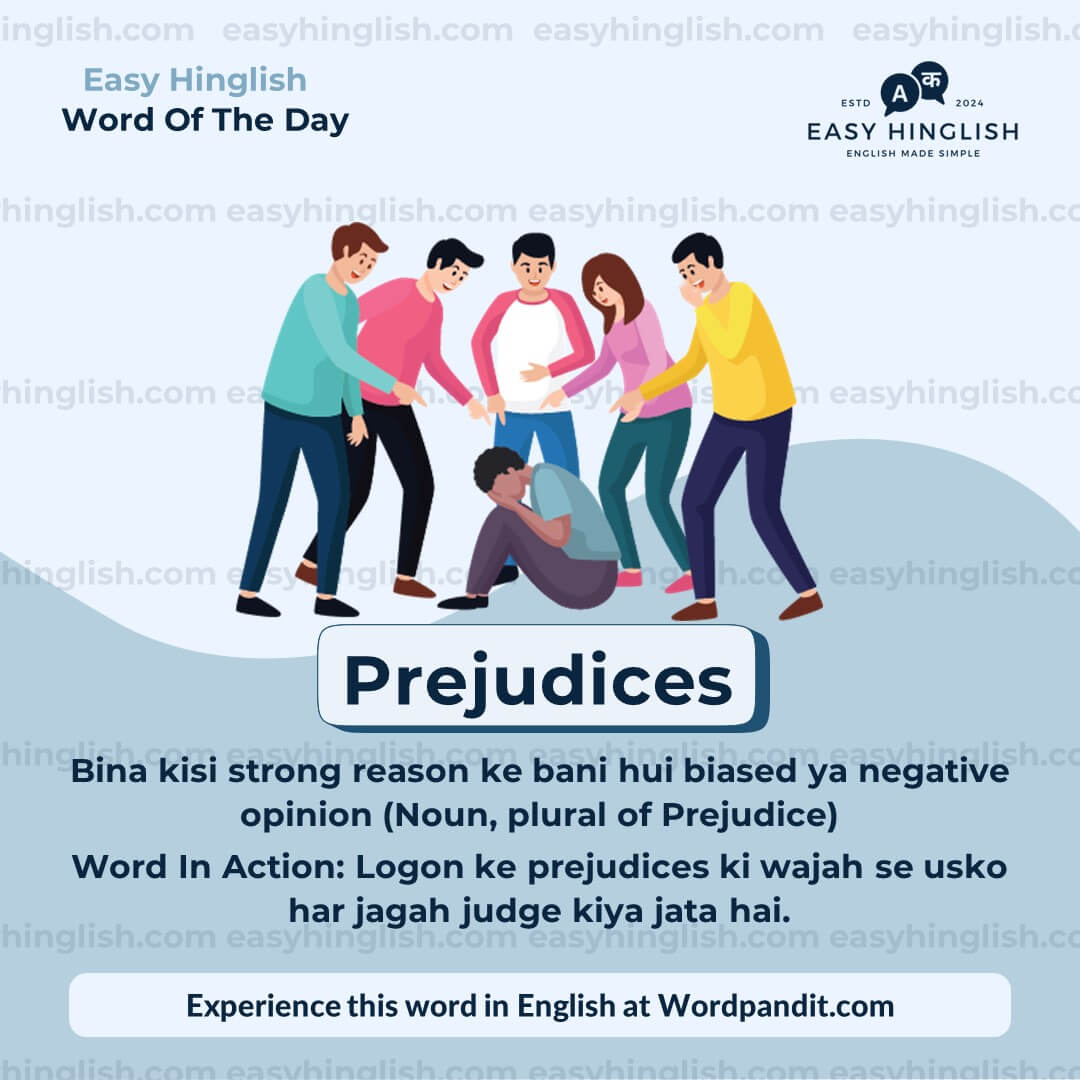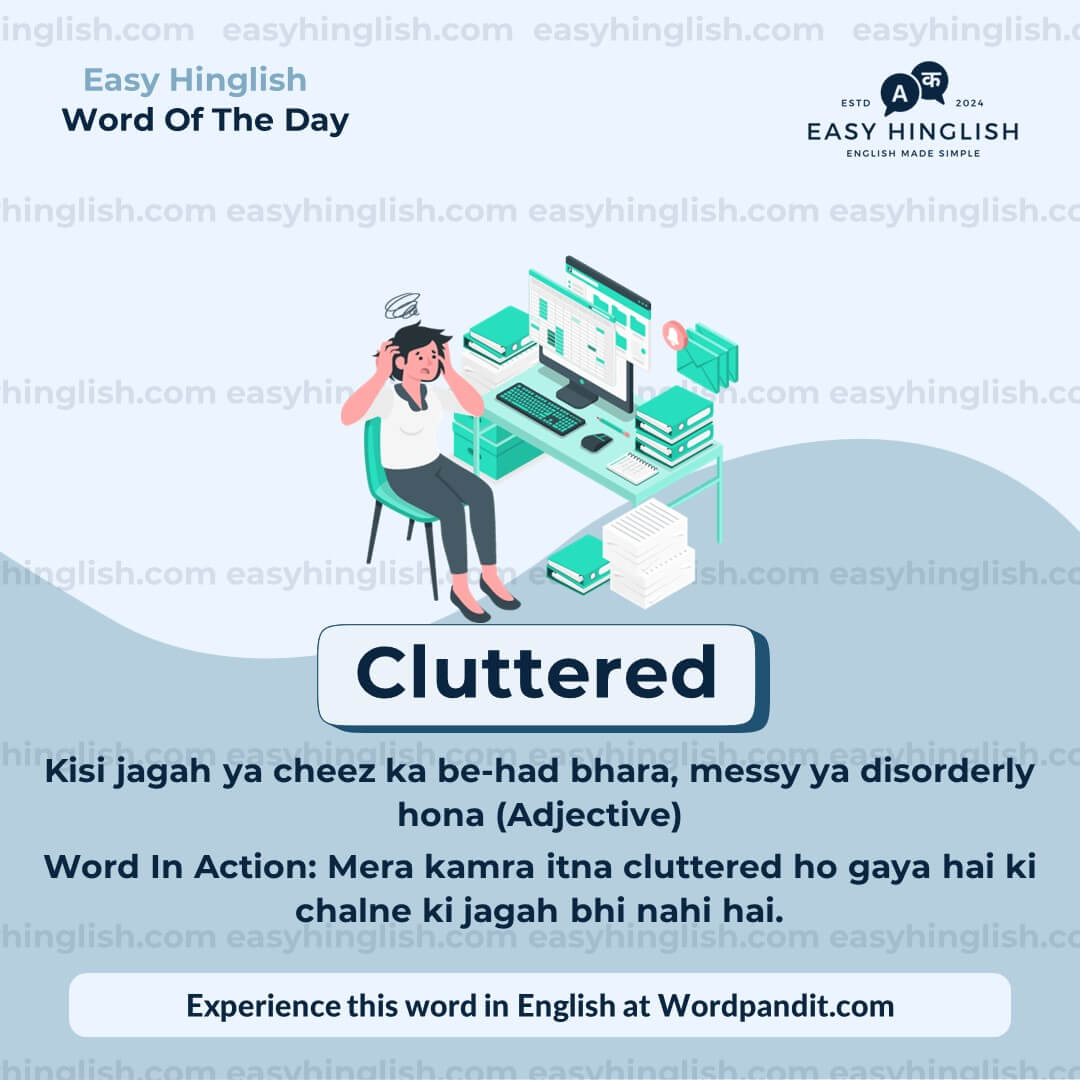Daily Vocabulary International Newspapers aur Publications se Seekho
Wordpandit ke Global Vocabulary Hub ke Saath Apni Vocabulary Expand Karo
Wordpandit par, hum aapko ek truly global vocabulary develop karne me madad karte hain, jo duniya ke sabse respected international publications se li gayi hoti hai. Yeh section aapko naye words se introduce karne ke liye design kiya gaya hai jo global conversations aur trends ko define karte hain.
Global Sources ka Power
Aapko globally sochne aur communicate karne me madad dene ke liye, hum vocabulary curate karte hain world ke top international sources se, jaise:
- The New York Times
- The Washington Post
- BBC
- The Guardian
- The Economist
- Scientific American
- Psychology Today
- Aur bhi bahut saare...
Globally Socho, Competitively Seekho
Hamare daily updates se aap international publications ke naye words seekhoge jo global news aur developments se jude hote hain. Isse aapki vocabulary current bhi rahegi aur globally relevant bhi.
Apni Global Soch Ko Expand Karo
Agar aap international exams ki tayari kar rahe ho, global business communication me excel karna chahte ho, ya sirf apni language skills improve karna chahte ho, toh Wordpandit aapko global level pe grow karne ke liye best resources provide karta hai.
Smart Learning, Global Reach
Hamari learning methodology me global examples, memory aids, aur interactive activities shamil hain, jo naye words ko effectively yaad karne aur real-world me use karne me madad karti hain.
Aaj Hi Apni Global Vocabulary Journey Shuru Karo!
Wordpandit Kyun Choose Karein?
Practical Learning: Aise words seekho jo real-world reading aur communication me aapko sach me kaam aayenge, taaki aapki comprehension aur bolne ki skills improve ho.
Diverse Content: Current affairs se lekar scientific breakthroughs tak, hamare different sources aapko multiple domains ki vocabulary seekhne ka moka dete hain.
Effortless Integration: Wordpandit ko apni daily routine ka part banao. Sirf kuch minute har din dene se aapki vocabulary time ke saath kaafi improve ho sakti hai.
Vocabulary Mastery Tak Ka Aapka Safar
- Regularly hamare Daily Vocabulary section ko visit karo
- Naye words explore karo aur unka context me use samjho
- In words ko apni writing aur bolne ki practice me use karne ki koshish karo
- Jaise-jaise aapke words badhte hain, apni progress ko track karo
Aaj Hi Apni Vocabulary Journey Shuru Karo!
Wordpandit ke saath vocabulary improve karna start karo. Roz thoda effort dalne se aap ek strong vocabulary develop kar sakte ho jo academic, professional, aur personal life me kaafi kaam aayegi.
Yaad rakho, ek naya shabd roz seekhna linguistic limitations ko door karne ka best tareeka hai! Wordpandit ko apni daily learning journey ka sathi banao aur vocabulary excellence ki taraf badho!
WORD-1: Prejudices
Sandarbh (Context):
"The work was made between 2022 and 2023 and really highlighted the flaws and prejudices in source data, questioning the role of the internet in appropriation and stereotyping." - The Guardian
Vyakhya (Explanatory Paragraph):
"Prejudices" ka matlab hota hai aise opinion ya soch jo kisi ke baare mein bina poori jaankari ke bana li jaati hai — aksar negative hoti hai. Jaise kisi insaan ke religion, jaat, gender ya appearance ke basis par uske saath unfair behavior karna. Sentence mein "prejudices in source data" ka matlab hai ki jo data available hai, usme biased soch chhupi hui hai — jo logon ko galat tareeke se dikhata hai, especially internet par.
Arth (Meaning): Bina jaankari ke pehle se bana hua negative opinion (Noun - plural)
Uccharan (Pronunciation): prej-uh-diss-iz
Kathinai Star (Difficulty Level): ⭐⭐ Beginner
Utpatti (Etymology): Latin word *praejudicium* se aaya hai, jiska matlab hai “pehle se judgment lena”
Prashant Sir Ke Tathya (Prashant Sir's Notes):
Prejudices wo mental block hote hain jo hume doosron ko objectively dekhne se rok dete hain. Hamesha apne aap se poocho — kya main facts pe react kar raha hoon ya assumptions pe? Yeh word social justice, media bias aur history ke context mein kaafi important hai.
Samanarthi & Vipritarthi (Synonyms & Antonyms):
Samanarthi (Synonyms): Biases, stereotypes, preconceptions, partialities, discriminations
Vipritarthi (Antonyms): Fairness, objectivity, open-mindedness, tolerance, impartiality
Udaharan (Usage Examples):
- Ek inclusive society banane ke liye hume apne prejudices ko face karna padega.
- Us jury ko hata diya gaya kyunki unmein racial prejudices ke signs the.
Sanskritik Sandarbh (Cultural Reference):
"Prejudice, not being founded on reason, cannot be removed by argument." - Samuel Johnson
Sochiye (Think About It):
Kya aap kabhi bina jaan bujh ke kisi ko judge karte hain? Aapke unconscious prejudices aapki decisions ko kaise affect karte hain?
Chhoti Kriya (Quick Activity):
3 aise prejudices likho jo aapne school, society ya media mein dekhe ho. Socho, unka impact kya tha un logon par jo affected hue.
Yaad Karne Ka Tarika (Memory Tip):
Socho: "Pre-judge" = pehle se judge kar lena. Prejudices ka matlab bhi wahi hai — bina facts ke soch lena.
Vastavik Jeevan Me Upyog (Real-World Application):
Jab aap interviews lete ho, policies banate ho, ya classrooms mein decisions lete ho — prejudices ko samajhna aur unse bachna bahut zaroori hai taaki sabke saath fairness ho.
WORD-2: Contaminate
Sandarbh (Context):
"PFAS can stay in the environment for decades, contaminate water supplies and cause a variety of health issues." - BBC
Vyakhya (Explanatory Paragraph):
"Contaminate" ka matlab hota hai kisi bhi cheez ko ganda ya unsafe bana dena, usually koi harmful substance mila ke. Jaise agar paani mein toxic chemical aa jaye, toh woh paani contaminate ho jaata hai. Yeh word environment, health, aur science mein kaafi use hota hai. BBC ke sentence mein yeh dikhaya gaya hai ki PFAS naam ke chemical kaise paani ko pollute kar sakte hain aur health problems create karte hain.
Arth (Meaning): Kisi cheez ko harmful ya unsafe bana dena by adding something dangerous (Verb)
Uccharan (Pronunciation): kuhn-TAM-uh-nayt
Kathinai Star (Difficulty Level): ⭐⭐ Beginner
Utpatti (Etymology): Latin word *contaminare* se liya gaya hai, jiska matlab hai "pollute ya corrupt karna"
Prashant Sir Ke Tathya (Prashant Sir's Notes):
Contaminate word aksar science, environment aur health ke topics mein use hota hai. Jab bhi aap yeh word dekhein, samajhiye ki kisi cheez ko harmful banaya jaa raha hai — chahe woh air ho, food ho ya water. Serious implications hote hain iske.
Samanarthi & Vipritarthi (Synonyms & Antonyms):
Samanarthi (Synonyms): Pollute, taint, infect, spoil, sully
Vipritarthi (Antonyms): Purify, cleanse, sanitize, disinfect, sterilize
Udaharan (Usage Examples):
- Factory ka toxic waste river ko contaminate kar raha hai.
- Agar ek bimaar aadmi food handle kare, toh pura food contaminate ho sakta hai.
Sanskritik Sandarbh (Cultural Reference):
"We have modified the environment so radically that we must now modify ourselves to exist in this new environment." — Norbert Wiener (human impact including contamination)
Sochiye (Think About It):
Kya jo companies jaan bujh kar natural resources ko contaminate karti hain, unpe criminal case hona chahiye? Kya aap agree karte ho?
Chhoti Kriya (Quick Activity):
List karo 3 tareeke jisse contamination daily life mein hoti hai (jaise: food, water, air). Har ek ka ek solution bhi suggest karo.
Yaad Karne Ka Tarika (Memory Tip):
Socho: “con + tamper + innate” — jab kuchh naturally safe cheez mein kisi ne chhed-chhaad (tampering) ki aur woh harmful ban gayi.
Vastavik Jeevan Me Upyog (Real-World Application):
Paani ke plant, hospital ki hygiene ya food industry mein — contaminate hone se bachna essential hai taaki log healthy rahein. Yeh concept public health aur environment ke liye bahut important hai.
WORD-3: Impressionistic
Sandarbh (Context):
"These impressionistic images tapped into a psychological narrative that refreshed the veterans’ interpretations of conflict." - The Guardian
Vyakhya (Explanatory Paragraph):
"Impressionistic" ka matlab hota hai aisi cheez jo exact details ya facts ke bajaye feelings, mood ya personal interpretation pe based hoti hai. Art mein yeh term un paintings ke liye use hoti hai jo light, color aur emotions capture karti hain — jaise Monet ki paintings. Upar wale sentence mein, "impressionistic images" ka matlab hai aisi tasveerein jo veterans ke emotions aur memory ko touch karti hain, bina exact scenes dikhaye.
Arth (Meaning): Jo subjective feeling ya emotional impact par based ho, na ki facts ya specifics par (Adjective)
Uccharan (Pronunciation): im-PRESH-uh-niss-tik
Kathinai Star (Difficulty Level): ⭐⭐⭐ Intermediate
Utpatti (Etymology): French word *impressionniste* se aaya, jo 19th-century ke Impressionism art movement se linked hai; Latin *imprimere* = “impression dalna”
Prashant Sir Ke Tathya (Prashant Sir's Notes):
Yeh word sirf art ke liye nahi — literature, writing style aur daily experiences ke liye bhi use hota hai. Jab aap kisi cheez ko exact tareeke se explain nahi karte, par ek overall feeling dete ho — woh impressionistic hota hai. Jaise ek dhundhli ya dreamy yaad.
Samanarthi & Vipritarthi (Synonyms & Antonyms):
Samanarthi (Synonyms): Vague, subjective, expressive, artistic, suggestive
Vipritarthi (Antonyms): Literal, factual, realistic, detailed, objective
Udaharan (Usage Examples):
- Writer ne impressionistic style mein likha, jisme zyada focus emotions par tha, details par nahi.
- Uski painting ek exact scene nahi dikhati, par ek mood ya feeling ko express karti hai — kaafi impressionistic hai.
Sanskritik Sandarbh (Cultural Reference):
Impressionism ek famous art style tha jise Monet, Degas jaise artists ne popular banaya. Unka goal tha light, colors aur fleeting moments ko capture karna — bina sab kuch exact paint kiye.
Sochiye (Think About It):
Kya kabhi emotions factual truths se zyada sach bolte hain? Kya ek blurry yaad kabhi ek clear report se zyada honest hoti hai?
Chhoti Kriya (Quick Activity):
Apne bachpan ke kisi jagah ka 3-line impressionistic description likho. Facts chhodo — sirf feelings, colors aur smells pe focus karo.
Yaad Karne Ka Tarika (Memory Tip):
"Impressionistic" matlab bas ek "impression" dena — jaise ek blur photo jo mood batata hai, details nahi.
Vastavik Jeevan Me Upyog (Real-World Application):
Impressionistic style ka use journalism, poetry, film, aur therapy tak mein hota hai — jab facts ke bajaye feelings dikhani hoti hain. Yeh human experience ko capture karne ka ek artistic tareeka hai.
WORD-4: Upending
Sandarbh (Context):
"However, as Moye explains, she’s not upending a tradition, but simply putting her own spin on pottery’s history as an accessible ‘folk language’ that’s rarely shied away from matters of sex." - Aeon
Vyakhya (Explanatory Paragraph):
"Upending" ka matlab hai kisi cheez ko ulat dena ya uska pura system ya meaning badal dena. Yeh word sirf physically kisi cheez ko ulatne ke liye nahi, balki metaphorically bhi use hota hai — jaise kisi tradition, rule ya structure ko disrupt karna. Sentence mein Moye keh rahi hain ki woh kisi tradition ko destroy nahi kar rahi, bas apna unique touch de rahi hain — yaani woh tradition ko redefine kar rahi hain, upend nahi kar rahi.
Arth (Meaning): Kisi system, idea ya norm ko disrupt ya overturn kar dena (Verb - present participle)
Uccharan (Pronunciation): up-END-ing
Kathinai Star (Difficulty Level): ⭐⭐⭐ Intermediate
Utpatti (Etymology): Middle English *up- + enden* se bana hai — shuru mein iska matlab tha kisi cheez ko physical tareeke se palat dena, lekin ab metaphorically bhi use hota hai
Prashant Sir Ke Tathya (Prashant Sir's Notes):
Upending ek powerful shabd hai jab bhi kisi bade badlav ya disruption ki baat hoti hai. Jab koi system ya tradition completely naya shape le — toh hum kehte hain it was “upended.” Academic essays mein use karo jab innovation ya revolution pe likhna ho.
Samanarthi & Vipritarthi (Synonyms & Antonyms):
Samanarthi (Synonyms): Disrupting, overturning, transforming, toppling, reversing
Vipritarthi (Antonyms): Preserving, maintaining, continuing, sustaining, reinforcing
Udaharan (Usage Examples):
- Uber jaise startups ne traditional taxi system ko poori tarah upend kar diya.
- Climate change duniya ke weather patterns ko upend kar raha hai.
Sanskritik Sandarbh (Cultural Reference):
Companies jaise Uber aur Airbnb ko "industry upenders" bola jaata hai — kyunki inhone traditional systems ko disrupt karke naye models introduce kiye.
Sochiye (Think About It):
Kya kisi purani tradition ko upend karna progress ke liye zaroori hota hai? Ya humein apne roots ka dhyan bhi rakhna chahiye?
Chhoti Kriya (Quick Activity):
Do modern inventions likho jo kisi traditional tareeke ko upend kar chuke hain. Har ek ke impact ko short mein explain karo.
Yaad Karne Ka Tarika (Memory Tip):
Socho ek table ko literally "up-end" kar diya gaya ho — sab kuch ulat gaya! Bilkul waise hi kisi system ya idea ko upending karna hota hai.
Vastavik Jeevan Me Upyog (Real-World Application):
Media, tech, politics aur art mein jab koi naye tareeke se sochta ya kaam karta hai — aur purane rules challenge ho jaate hain — tab use “upending the system” kaha jaata hai. Yeh change ko describe karne ka dynamic word hai.
WORD-5: Cluttered
Sandarbh (Context):
"Telling her story from the cluttered yurt in the Bulgarian countryside that she now calls home..." - Psyche
Vyakhya (Explanatory Paragraph):
"Cluttered" ka matlab hota hai kisi jagah ya cheez ka itni chizon se bhara hona ki woh messy ya disorganized lagne lage. Sirf physical space ke liye nahi, yeh word mind, routine, ya design ke context mein bhi use hota hai. Upar wale sentence mein, "cluttered yurt" dikhata hai ki uski rehne ki jagah mein cheezein itni zyada hain ki woh organized nahi lagti — shayad yeh modern life ke complexity se escape ka symbol bhi hai.
Arth (Meaning): Bahut saari chizon se bhara hua, jo aksar disorganized ya messy ho (Adjective)
Uccharan (Pronunciation): KLUT-urd
Kathinai Star (Difficulty Level): ⭐ Beginner
Utpatti (Etymology): Middle English *clotter* se aaya hai, jiska matlab tha “jamna ya chipakna,” jo baad mein physical mess ya bheed ke sense mein use hone laga
Prashant Sir Ke Tathya (Prashant Sir's Notes):
Cluttered sirf ek room ka messy hona nahi batata — ek cluttered mind, inbox, ya schedule bhi batata hai ki cheezein out of control hain. Is word ka use clarity aur simplicity ki importance dikhane ke liye bhi hota hai.
Samanarthi & Vipritarthi (Synonyms & Antonyms):
Samanarthi (Synonyms): Messy, chaotic, disorganized, jumbled, crowded
Vipritarthi (Antonyms): Tidy, organized, neat, minimalist, streamlined
Udaharan (Usage Examples):
- Uski desk itni cluttered thi ki usse apne notes mil hi nahi rahe the.
- Ek cluttered mind productivity ko bahut impact karta hai.
Sanskritik Sandarbh (Cultural Reference):
Marie Kondo ne apni book *The Life-Changing Magic of Tidying Up* mein decluttering ko promote kiya — unka mantra tha: “Sirf wahi cheezein rakho jo joy deti hain.”
Sochiye (Think About It):
Kya humari physical environment hamari mental state ko reflect karti hai? Agar hum apna room clean karein, toh kya dimaag bhi saaf mehsoos karega?
Chhoti Kriya (Quick Activity):
Apne room ka ek chhota part (jaise ek drawer ya shelf) choose karo aur usse declutter karo. Dekho ki aapko is process ke baad kaisa feel hota hai.
Yaad Karne Ka Tarika (Memory Tip):
“Cluttered” ko “clogged” ki tarah socho — jab kuchh bhar jaata hai aur block ho jaata hai. Cluttered = bharahua + blocked + messy!
Vastavik Jeevan Me Upyog (Real-World Application):
Interior design, productivity coaching aur mental health therapy mein cluttered spaces ko identify karke unhe organize karna ek important step hota hai — taaki stress kam ho aur focus badhe.













